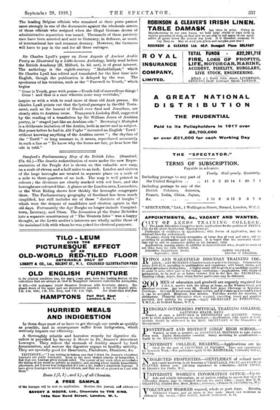Sir Charles Lyall's paper on Some Aspects of Ancient Arabic
Poetry as Illustrated by a Little-known Anthology, lately read before the British Academy (H. Milford, Is. 6d. net), is of great interest. The anthology is the eighth-century " 31ufaddaliyat," which Sir Charles Lyall has edited and translated for the first time into English, though the publication is delayed by the war. The specimens of his versions, such as the " Farewell to Youth," which begins
" Gone is Youth, gone with praise—Youth full of marvellous things ! Gone ! and that is a race wherein none may overtake,"
inspire us with a wish to read more of these old Arab poems. Sir Charles Lyall points out that the lyrical passages in the Old Testa- ment, such as the lament of David over Saul and Jonathan, are closely akin to Arabian verse. Tennyson's Locksley Hall, suggested by the reading of a translation by Sir William Jones of Arabian poetry, is " staged just like an Arabian ode." Browning's Muleykeh is a deliberate imitation of the Arabic, both in metre and in subject. But years before he had in Abt Vogler " invented an English Tamil ' without knowing anything of the Arabian metre " ; the rhythm of the " Tawil " or long measure is, it seems, reproduced accurately in such a line as " Ye know why the forms are fair, ye hear how the tale is told."


























 Previous page
Previous page